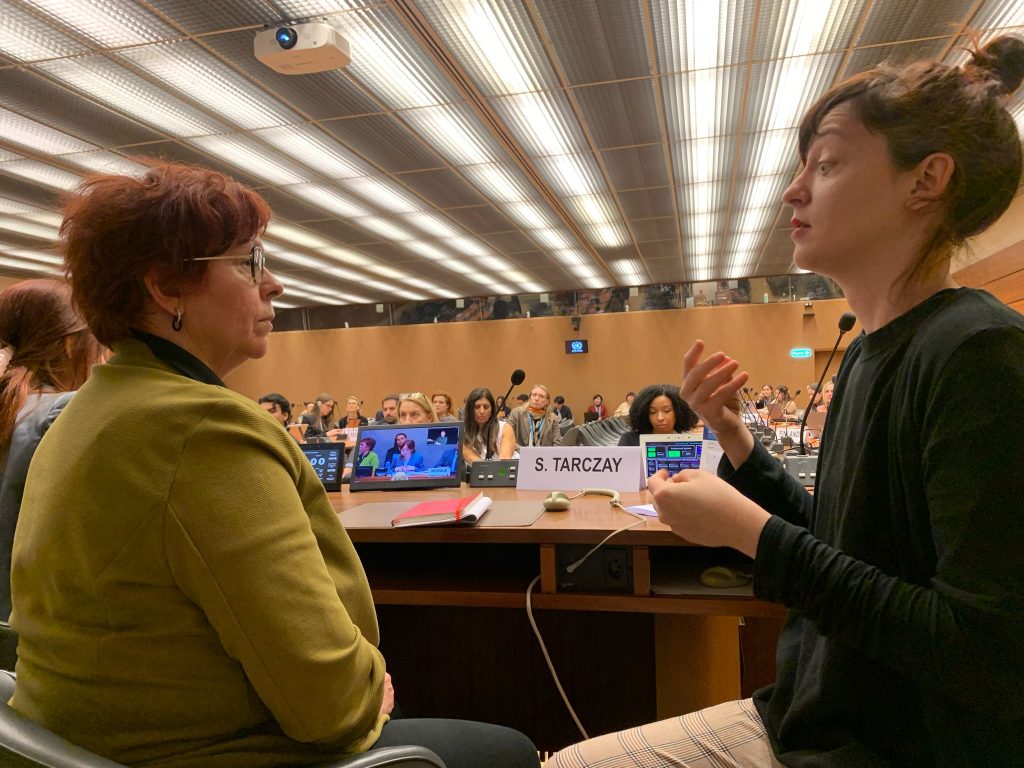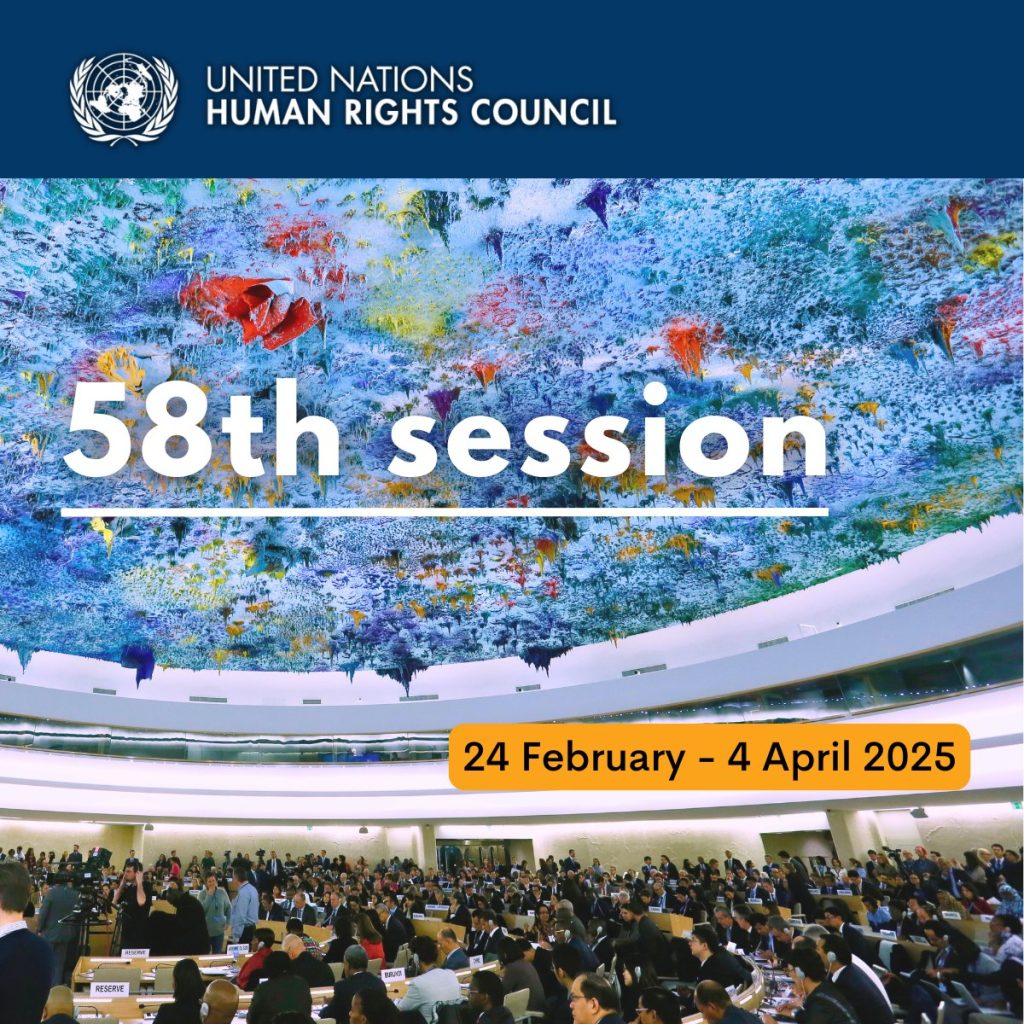Geneva, Switzerland – On March 10, 2025, Sanja Tarczay, President of the World Federation of the Deafblind and Executive Committee member of the International Disablity Alliance, delivered a powerful address at the 58th regular session of the United Nations Human Rights Council (UN HRC) in Geneva. Invited as a panelist for the Annual Interactive Debate on the Rights of Persons with Disabilities, President Tarczay spoke on the critical importance of digital and assistive technologies for persons with disabilities, emphasizing that these tools are essential for autonomy, independence, and full participation in society.
In her intervention, President Tarczay reminded the international community that “access to assistive technology is not a privilege; it is a fundamental human right,” as enshrined in the United Nations Convention on the Rights of Persons with Disabilities (CRPD). She stressed that, despite global commitments, many persons with disabilities, including those with deafblindness, still face significant barriers in accessing the technologies they need to communicate, move freely, and engage in daily life.
A Call for Greater Access to Assistive Technologies
President Tarczay highlighted a disturbing global reality: “only one in ten people globally has access to the assistive products they need.” Even in high-income countries, individuals with disabilities often struggle with high costs, limited availability, and a lack of policy support for necessary assistive technologies. She called for more robust financial accessibility mechanisms to ensure these tools do not become a burden for those who need them most.
However, the issue goes beyond mere availability. “For many persons with disabilities, especially those with deafblindness, technology can complement but not replace personal assistance,” President Tarczay explained. She emphasized the essential role of guide-interpreters/Deafblind interpreters in supporting full participation in society. Without human support, even the most advanced technologies cannot guarantee true inclusion and autonomy.
Ensuring People with Disabilities Have the Right to Choose
In her speech, President Tarczay also raised concerns about the limited options available for persons with disabilities when it comes to selecting assistive devices. “Every person should have the right to select and obtain the device that best supports their communication and independence,” she stated, urging the international community to move towards a more person-centered approach in the development and distribution of assistive technologies.
The Importance of Training for Effective Use of Assistive Technologies
A key point highlighted by President Tarczay was the urgent need for training for professionals and caregivers. She stressed that even when assistive technologies are available, the lack of proper training for professionals can be a significant barrier. “Few professionals are trained in sign language or in the communication methods used by deafblind persons,” she explained, which limits the effectiveness of the devices. Proper training is essential not only to ensure that the devices are used correctly but also to maximize their potential and ensure that persons with disabilities can fully benefit from them in their daily lives.
A Human Rights-Based Approach to Technology
Emphasizing the need for a human rights-based approach, President Tarczay called for greater involvement of persons with disabilities and their representative organizations in the design and development of assistive technologies. “Assistive technology must be integrated into national health and social care policies,” she said, underlining the importance of collaboration between governments, civil society, and the private sector to drive innovation and expand access.
She also called for increased international cooperation to reduce disparities in access to assistive technologies, ensuring that the right to these tools is upheld globally. “International cooperation is key to ensuring that the right to assistive technology is upheld everywhere, not just in some parts of the world,” she concluded.
A Responsibility to Act
President Tarczay’s intervention at the UN HRC 58th session serves as a timely reminder of the need to prioritize the rights and needs of persons with disabilities in all aspects of policy and development. “Ensuring access is not an option—it is an obligation,” she said, urging governments and organizations worldwide to commit to building a more inclusive world where everyone, regardless of ability, can fully participate.
Relevant links
Watch Sanja’s Speech for the 58th Edition of the Human Rights Council
Side event on Women and Girls with Disabilities
On Tuesday, 11 March, from 2:00 to 3:00 PM at the UN in Geneva, Sanja Tarczay delivered a powerful and compelling speech at the side event titled “The Rights and Voices of Women and Girls with Disabilities in Global Agendas.” Moderated by José Viera, Executive Director of the International Disability Alliance (IDA), the session focused on the profound challenges that women and girls with deafblindness face.

This side event, held on the margins of the 58th session of the UN Human Rights Council, was co-hosted by the Permanent Missions of Mexico and New Zealand. It brought together global experts, policymakers, and advocates, providing an important platform for advancing the rights of women and girls with disabilities and fostering meaningful conversations on inclusive development.
By engaging in this crucial dialogue, Sanja reinforced the importance of not only raising awareness but also driving forward action that ensures marginalized voices, particularly those of women and girls with disabilities, are heard and addressed in global agendas. The event served as a vital step in the ongoing fight for a more inclusive and accessible world for all.

